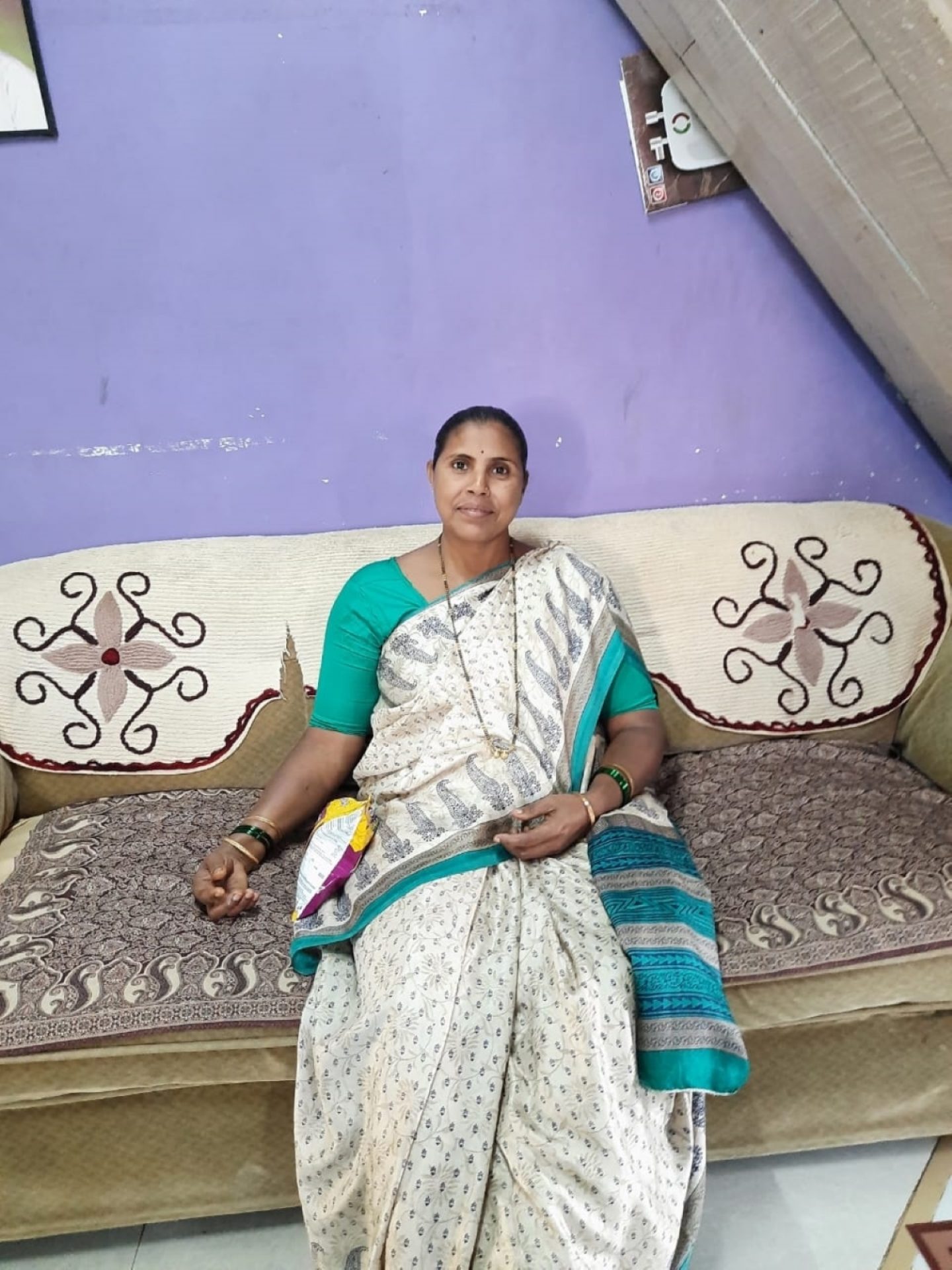Madhuri Mangela (Photo credit: Ishita Patil)
Madhuri Mangela, 45, is a fish-vending woman from Satpati, where she resides with her two children, a daughter and a son. Her father was a boat owner from Gujarat. Due to hardships and her mother’s deteriorating health, Madhuri and her sister’s education were neglected.
She attended school until the 8th grade in the Gujarati language in a village named Maroli in Gujarat. As her father would often come to Satpati on his fishing trips, he eventually bought land in the village and built a house for his fishing business with space for net weaving. Faced with losses, some years later, her father shut the boat business. By now, Madhuri was doing household chores and also buying and selling fish. She got married at the age of 28 through an arranged marriage.
Madhuri moved back to her parents’ house in Satpati some eight to nine years ago with her two children. She prioritised her children’s education and enrolled them in an English-language private school in Satpati. Being solely responsible for her children now, she has been working tirelessly to become financially independent through her fish-vending business.
Unlike most fish-vending women, Madhuri sells both fresh and dry fish at retail and wholesale markets. ‘Satpati market is expensive for me’, says Madhuri, who buys her fish stock from a Sunday market near Daman, Maroli village, and Okha markets. As an entrepreneur, she has identified markets, wholesalers as well as selling opportunities to reduce her costs and have higher profits. From January to May, she focuses on the sale of dry fish, which includes buying fish, curing and processing it for weeks before selling it. She extends selling dry fish until June, as she receives orders. The monsoon months (July-September) are tough as fish is expensive to buy and consumers bargain for a cheaper rate, which is when Madhuri chooses not to work. For the rest of the year, she sells fresh fish.
Madhuri spends the whole day travelling back and forth to Gujarat. Changing trains and rickshaws, she returns home by 5 pm with 100-150 kilos of fish. She sells by weight in the morning market in Satpati, while the remaining stock is sold at piece rate in the evening retail market. Depending on demand and supply, Madhuri makes decisions regarding her business. Her siblings have supported her financially, and her brother, who works with a fisheries co-operative society, helped her make contacts during the early days. Now, she responds to every call order and seizes every opportunity that comes her way. Madhuri earns approximately Rs 10-12,000 (€110-130) in good months, but this amount is negatively affected by the dwindling fish stock. ‘The market condition is such because of lesser fish; it is difficult. The consumer wants to pay less, but it is not possible to buy good quality fish at a cheaper price.’
All her income goes towards educating her children. Though difficult, she saves Rs. 10 (€0.11) for each of her children in a local rotating credit facility. In June, when business is lean, schools reopen, creating expenses for stationary, books, uniform, and similar. She uses the savings to cover these payments. ‘I will take all required efforts needed to educate my children. It will give them a good future, and I will hopefully be able to witness it while I am still alive.’
Her parents passed away years ago, she does not have to pay rent, and she handles other household expenses. Being the youngest of her siblings, they support her financially. Her sister sends clothes for her kids, so Madhuri does not need to spend money on that. She rarely finds time to socialise but makes sure that her family regularly attends religious and cultural gatherings in the village. They visit the temple daily to offer prayers. ‘Business is the most important, as your livelihood depends on it’, says Madhuri. However, she then corrects herself, giving importance to spiritual thinking. She hopes to have the ability to develop further in her life to be able to provide her children with a better future. ‘One should have a personal identity. And be able to define oneself. Only if I have this will I be able to have confidence to earn money, lead my life. This is very important.’
Ishita Patil and Nitya Rao
